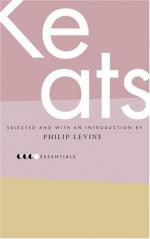|
This section contains 2,363 words (approx. 8 pages at 300 words per page) |

|
SOURCE: "Cipriano Mera and the Lion: A Reading of Philip Levine," in Imagine, Vol. 1, No. 2, Winter, 1984, pp. 148-54.
In the following essay, Marchant discusses the spirit of anarchism in Levine's poetry.
Not many people in the United States would call themselves anarchists, but the poet Philip Levine does. In so doing he does not mean to invoke the image of a terrorist, a bomb in hand. Instead, he wants to acknowledge his passionate opposition to any soul-destroying forces in our social relations. His anarchism means that he does not believe in "the validity of governments, laws, charters" because they "hide us from our essential oneness." Levine has also said that his anarchism is "an extraordinarily generous, bountiful way to look at the universe," and that it has to do with "the end of ownership, the end of competitiveness, the end of a great deal of things that are...
|
This section contains 2,363 words (approx. 8 pages at 300 words per page) |

|


